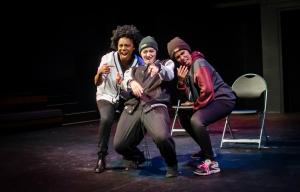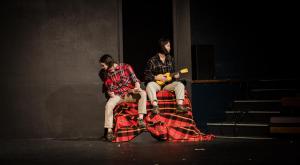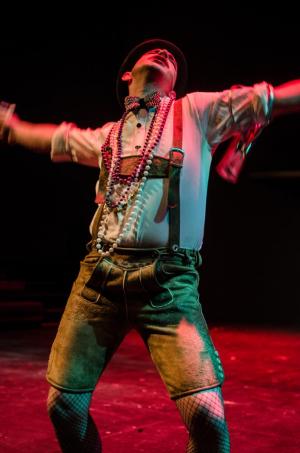New Class Performs Beyond the Binary

“Basically everything is gendered, from what you can eat, to what you get paid, to whether you take care of our elders,” says Jean O’Hara, professor of theater, gender studies, and environmental studies. “We don’t outwardly acknowledge it, but there is a very strong gender hierarchy in our society—there are genders that are devalued or made invisible—which we often unconsciously internalize. I think there’s a power in exposing this and complicating the way we express who we are.”
Last spring, Jean co-taught a course with anthropology professor Nelli Sargsyan titled Drag: History, Politics, and Performance. The class wove together feminist anthropological theory, queer theory, and trans theory to examine gender, gender roles, and gender performance. After exploring the history and ethnographic research of drag performance across a variety of sociocultural and political settings, from Kabuki theater to RuPaul’s Drag Race, the class culminated in a spectacular drag performance all their own.
“Through their understanding of the theory and through their performance, students were mostly just lifting each other, making room for those kinds of expressions that are not given room,” says Nelli. “I quote this Zapatista commander who said, and I paraphrase, ‘I want a world that allows for the existence of many worlds.’ That was my sense of our course.”
Both Nelli and Jean did doctoral dissertations focusing on gender, sexuality, and ethnicity. Nelli examined how Armenians negotiate their gender, race, and sexual difference in both the U.S. and Armenia, while Jean explored “two-spirit” performances as acts of survival and resistance to colonial gender and sexuality systems of oppression. Together, they saw the potential in an academic class as a way to deeply explore these intersections through both theory and embodiment.

“It’s easier to intellectually analyze these things, much easier than embodying them,” says Nelli. “But because of Jean’s interest, and Jean being a theater director, I felt very comfortable pursuing a more embodied ethnography of gender performance.”
In addition to reading theory and ethnographic research, students were expected to write an autoethnography of their own gender experience, using everyday experiences to make sense of culturally and socially installed systems in their lives. “We asked students to take weekly notes about how they’re enacting gender: what are the gendered ways in which they interact throughout the day?” says Nelli.
“I like to think of gender as a performance, with anyone being able to express themselves in the gender they desire to be,” says Karla Julia Ramos, a sophomore studying theater and psychology. “People give off these signals when they are ‘performing’ their gender. It’s in the way someone talks, walks, sits—it’s all been conditioned by our society.”
“Not all peoples or cultures organize themselves based on gender, and that was really important for us to talk about too,” says Jean. “We started with Indigenous people of this land, who organize based on a spiritual path, or strengths, or participation in the community. There is a sense of reciprocity. Often in their languages there isn’t even a word for ‘I’—it’s always ‘we’—and there are no gendered pronouns, so you are just a person.”

That kind of selfless collaboration and gender complexity was very evident in the class’s much anticipated April performance, titled Drag Queens, Kings, and Much More. Far from reinforcing the typical gender binary, and its inherent sexism, the show invited the audience to expand their understanding of gender expression through a series of very touching and personal acts. Performed once in Whittemore Theater and once at Hooker Dunham Theater in Brattleboro, the performance was a benefit for Green Mountain Crossroads, a nonprofit organization serving the local LGBTQ community.
“By putting myself out there for the first time in my community and performing as a drag queen, let alone my first performance ever, I believe I was able to tap into my ability to produce a lasting effect,” says sophomore Day Rodriquez. “The audience’s support enhanced my confidence, and it was eye-opening to see my physical transformation unfold before my own eyes.” Day wrote an editorial for the Huffington Post about his experience: goo.gl/xEUAai.
“My favorite part of the drag show by far was that I was able to express myself and perform something I like to do—which is dancing—and to learn about myself in the process,” says sophomore Cyane Thomas. She is studying Korean popular culture and finds that gender performance plays a huge role in “K-Pop.” “The show and the class both made me realize that gender is expressed by individuals themselves, not by what society assigns.”
The production was co-created by all the performers, including Nelli and Jean, in an ensemble fashion. The students wrote scripts, choreographed movement, chose music, and determined the message they wanted to convey. Each student was involved in three or four acts, ranging from an interrogation of Bond-style “gentleman killers,” titled “007 Shakin’ & Stirred,” to an examination of gender, intercultural challenges, sexism, and the directions to Costco. There was humor, sadness, irony, and a sense of limitless possibilities.
“Not one of the pieces put anyone down or claimed power at the expense of someone else,” says Nelli, whose act with Jean in day-glow pantsuits, called “Otta Love,” was reprised on demand at the senior dinner before commencement.
“It was really amazing how many people said this was their favorite Marlboro show ever, because it wasn’t this polished piece,” says Jean. “I think it speaks to our desire, all of us, to see gender represented in a less heteronormative, binary way, to see something that is within us reflected back, even if we don’t get to express it—to live in a world with much more interesting, beautiful, layered, complex ways of expressing ourselves.” See an excerpt of the show.
